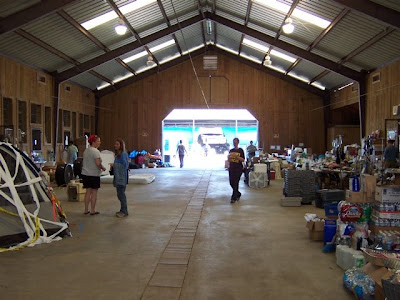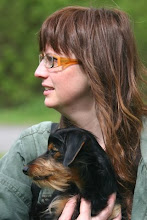 Miracles happened amid destruction. These orphaned kittens were born during the storm. Here we are in the barn tending to them. The seats we're sitting on were pulled out of all of our vehicles to make more room for animals. They formed an impromptu sitting area for volunteers on a rare break.
Miracles happened amid destruction. These orphaned kittens were born during the storm. Here we are in the barn tending to them. The seats we're sitting on were pulled out of all of our vehicles to make more room for animals. They formed an impromptu sitting area for volunteers on a rare break. I am accustomed to being treated like an oddball when I venture into the public domain. People’s negative reactions towards my viewpoints about animals might range from suspicion to outright ridicule.
A party, a shop, even a restaurant aren’t places where I can completely let my guard down and relax, because I never know where the hits will come from next. Even a task that appears as benign as getting a meal can turn hostile. One time, I tried to order vegetarian at a restaurant in San Antonio, Texas. The waiters were so outraged that you’d think I’d threatened to throw rotten eggs at the Alamo.
It’s happened so frequently over the past two decades that the hostility whirs like an operating system in the background of my social interactions. I’ve grown so used to it being there that I’m barely phased anymore, and don’t pay it much notice.
At least, I hadn’t noticed it. Not until it was gone. Four years ago, I rocked up to the borrowed barn operation being run by Pasado’s Safe Haven. With New Orleans without power, water, or sanitation thanks to Katrina’s merciless blow, shelters had popped up around the city’s perimeter. This makeshift shelter was 45 minutes south. It was a haven for the frightened, orphaned animals left behind.
But it was a safe spot for the people, too—like-minded volunteers who had gathered together in one place for a singular life-saving mission. People like me, who didn’t have to explain to each other why we were risking our health and safety to help the animals, and not the humans. Everybody on that 150-acre property felt just like I did.
Amidst the hell we would come to experience in the months to come, here was a tiny piece of heaven. The beauty of that unexpected effect juxtaposed against the ugliness we witnessed made the phenomenon all the more profound and awe-inspiring.
I stepped out of my minivan and immediately got to work with the other volunteers, scrubbing down carriers, walking dogs, and cleaning cat cages.
The condition of the animals was shocking. The rescuers who had infiltrated the city in the early weeks had faced greater numbers of pets roaming and locked up in houses than we saw, though there were still plenty of animals left requiring rescue. But those who came to rescue later in the mission found the animals when they were in terrible shape—emaciated, scared. Aggressive in some cases.
The appearance of the animals should have prepared us for what we would encounter when we got into the city. They were skinny, cut and bruised, and smelled like something I have never experienced before. A rank odor that I hope I don't ever smell again. Mold, toxic waste, garbage, and the dead carcasses of animals and people.
Katrina’s floodwaters rose and carried it all with her, turning the basin city into a soup of slime that coated everything when the waters finally receded. Including the animals. And us, when we waded in.
 This puppy was rescued from a house with his sister. He died shortly after this photo was taken, and his black and white sister (next photo) died after I delivered her to a veterinary clinic near the airport. I named her Daisy Ray.
This puppy was rescued from a house with his sister. He died shortly after this photo was taken, and his black and white sister (next photo) died after I delivered her to a veterinary clinic near the airport. I named her Daisy Ray. Daisy Ray survived a little longer than her mate before succumbing. No food and water for a month was too much for her tiny body to survive.
Daisy Ray survived a little longer than her mate before succumbing. No food and water for a month was too much for her tiny body to survive. The animals were fed, watered, even washed when their demeanor was calm enough to allow it.
The animals were fed, watered, even washed when their demeanor was calm enough to allow it. We found many black cats. This was one of the lucky ones. He almost seemed to know someone was on the way to get him. We labeled his carrier so he wouldn't get shipped out of state by mistake.
We found many black cats. This was one of the lucky ones. He almost seemed to know someone was on the way to get him. We labeled his carrier so he wouldn't get shipped out of state by mistake. The cats were kept in stalls inside the front barn to keep them calm and away from the barking dogs.
The cats were kept in stalls inside the front barn to keep them calm and away from the barking dogs. Dogs were staged in cages in the back barn, waiting for transport out of the area.
Dogs were staged in cages in the back barn, waiting for transport out of the area. Another photo of the back barn.
Another photo of the back barn. Donated supplies came rolling in. Animal lovers from around the country were following our progress on the Pasado's Safe Haven website. We even received a letter of support from Jane Goodall, the renowned primatologist! Donors sent food, leashes, brushes, toys, anything you can imagine...plus a few things that left us scratching our heads, such as several pairs of stiletto heels. In the end, they did make themselves useful by inspiring an impromptu chorus line. The ridiculous shoes made us laugh when we needed it most.
Donated supplies came rolling in. Animal lovers from around the country were following our progress on the Pasado's Safe Haven website. We even received a letter of support from Jane Goodall, the renowned primatologist! Donors sent food, leashes, brushes, toys, anything you can imagine...plus a few things that left us scratching our heads, such as several pairs of stiletto heels. In the end, they did make themselves useful by inspiring an impromptu chorus line. The ridiculous shoes made us laugh when we needed it most.  The barns were quieter during the day, because many volunteers headed into the city each morning. Others stayed behind to care for the survivors.
The barns were quieter during the day, because many volunteers headed into the city each morning. Others stayed behind to care for the survivors. As night fell, curfews kicked in, and rescuers had to leave the city or risk tangling with the military. The barns turned into organized chaos as rescuers from all over the country descended there with animals they had found roaming the city or locked up in houses. Animals were logged in, triaged, and settled into kennels.
As night fell, curfews kicked in, and rescuers had to leave the city or risk tangling with the military. The barns turned into organized chaos as rescuers from all over the country descended there with animals they had found roaming the city or locked up in houses. Animals were logged in, triaged, and settled into kennels. Follow me on Carreen’s Rescue Blog…
As I head into the decaying city, I’ll describe what we encountered when we arrived.








No comments:
Post a Comment